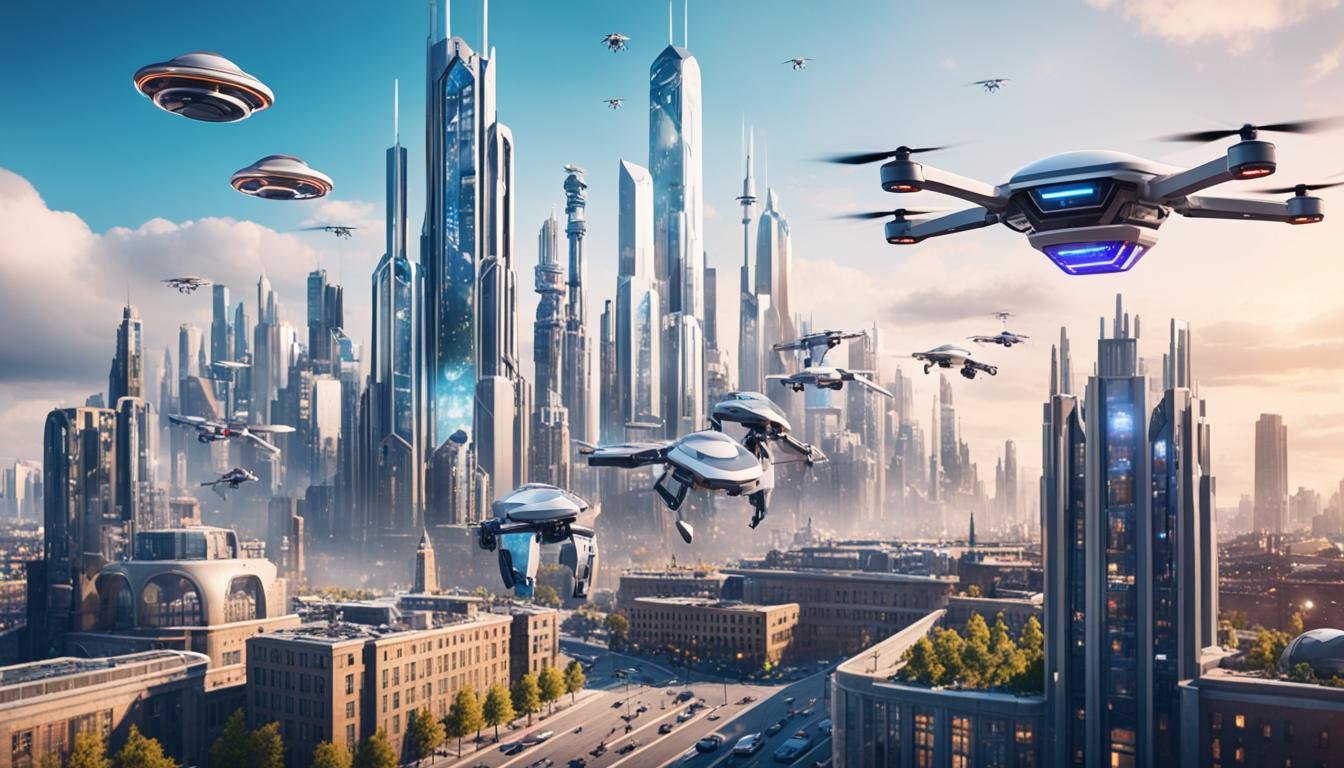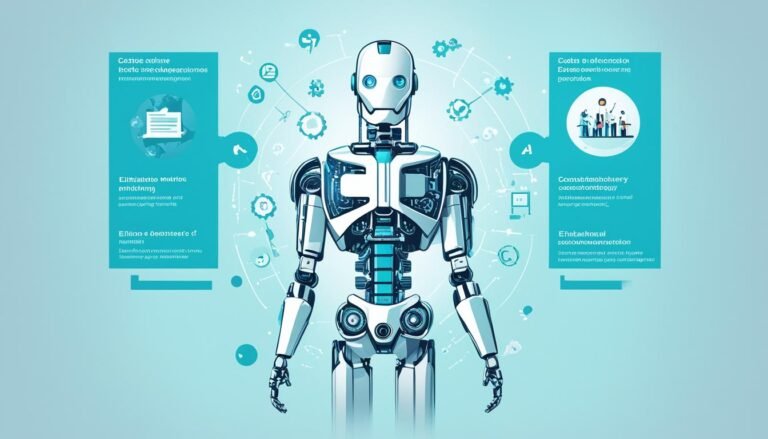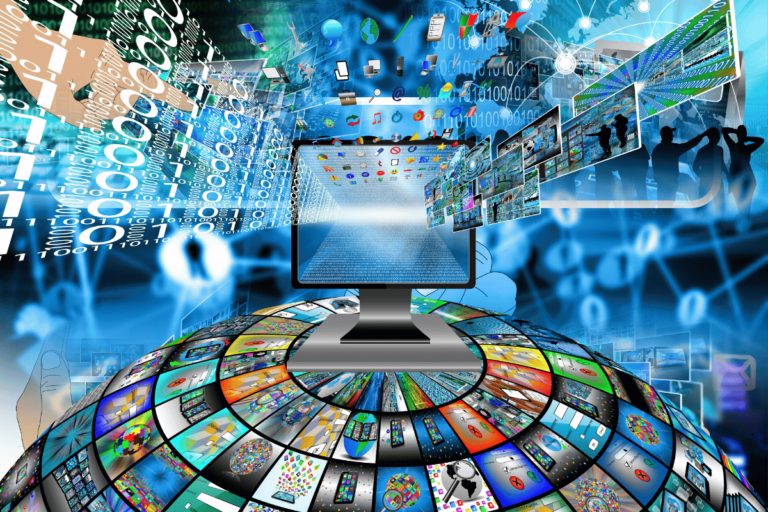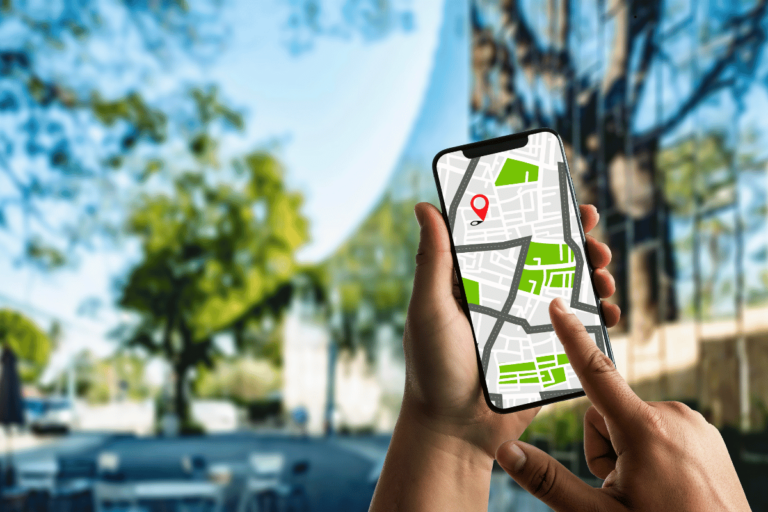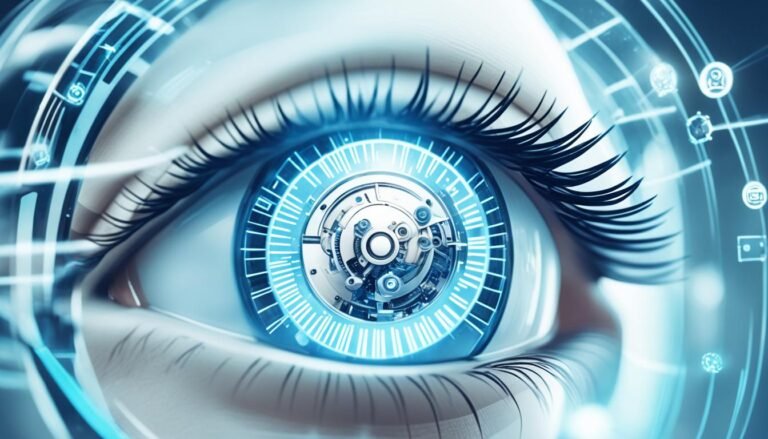Future of AI: Exploring the future applications and implications of AI.
Did you know the global AI market will hit $190.6 billion by 2025? This shows how big AI’s impact will be on our world soon. We’ll see big steps in AI tech, machine learning, and how AI changes society.
Key Takeaways:
- Artificial intelligence (AI) is set to transform various industries.
- Core functions like image and voice recognition, natural language processing, and machine learning will continue to drive AI applications.
- AI’s impact is expected to be significant in transportation, energy, environmental sustainability, and national security.
- Exploring the ethical considerations of AI and its role in automation will be crucial.
- Collaboration between AI and humans holds promise for the future.
Industries Where AI is Likely to Have the Most Significant Impact
Looking ahead, AI will change many industries. It will touch healthcare, finance, education, media, customer service, and transportation. AI will change how we work and live.
In healthcare, AI can change patient care a lot. It uses advanced algorithms to look at lots of medical data. This helps in diagnosing diseases, predicting treatment outcomes, and making personalized treatment plans.
Healthcare workers can make better and quicker decisions with AI. This leads to better patient care.
The finance world is also seeing AI’s impact. AI helps spot fraud quickly, reducing risks and protecting money. It also offers personalized investment advice, making managing money better and making customers happier.
Education is another area where AI is making a big difference. AI creates learning plans that fit each student’s needs and abilities. This helps teachers find and fix learning gaps, leading to better student results.
In media, AI changes how we make and share content. News outlets use AI to pick and share news that interests you. AI also suggests content you might like, making it easier to find what you want to watch or read.
Customer service is getting a boost from AI too. AI chatbots and virtual assistants help answer questions and solve problems fast. They make sure customers get help anytime, making them happier.
Finally, AI could change transportation with self-driving cars. These cars use AI and sensors to drive safely and make smart choices. This could make roads safer and change how we travel.
Looking to the future, AI’s effect on these areas will be huge. Using AI, we can innovate, work better, and make tomorrow better for everyone.
The Impact of AI on Our Lives in the Next 5, 10, or 20 Years
Looking ahead, AI will greatly change our daily lives. It will revolutionize many industries with its tech advancements. This includes healthcare, finance, and energy, changing how we live and work.
AI is set to transform healthcare. It can look through lots of data to find patterns. This helps doctors make better diagnoses and treatment plans. It means better health outcomes and more efficient healthcare.
In finance, AI can improve investment decisions and automate tasks. It uses machine learning to spot market trends and predict outcomes. This helps investors make smarter choices, leading to better portfolios and profits.
The energy sector will also see big changes thanks to AI. AI can make energy use more efficient and improve power grids. It helps use more renewable energy sources. This means less pollution and a greener energy future.
But, AI’s growth also worries about job loss. As it automates more tasks, many jobs might be at risk. Yet, AI can also create new jobs. It frees humans to focus on creative and complex tasks.
As AI grows, we must use it responsibly and ethically. It should enhance human skills, not replace them. Finding the right balance between AI and human skills is crucial. This way, we can enjoy AI’s benefits without its downsides.
Ethical and Social Implications of the Future of AI
The future of AI raises many ethical and social questions. We must look closely at these issues to make sure AI is developed and used responsibly. This ensures AI systems are ethical and work well for everyone.
Transparency is key in the future of AI. AI systems need to explain how they make decisions clearly. This helps build trust and makes AI more accountable.
AI could face a big challenge with bias. Algorithms might unfairly treat some groups or keep old biases. To fix this, AI must be checked for bias at every step of its creation.
Decisions made by AI should consider many viewpoints. It’s important to include people from various backgrounds and perspectives. This helps avoid bias and leads to better outcomes for everyone.
We need to think about how AI will affect society in the long run. As AI enters more areas like healthcare and jobs, we must look at the good and bad effects. We aim to lessen any harm to people or communities.
To deal with AI’s ethical and social issues, we focus on transparency, fighting bias, and being inclusive. We also think about the long-term effects. It’s up to all of us to make sure AI matches our values and helps create a fairer world.
The Evolution of AI and Its Future Potential
AI has grown a lot since its start. From early neural networks to today’s machine learning and deep learning, it has made big strides. Through ongoing research and innovation, AI has done amazing things in many areas.
One big win for AI is in self-driving cars. Companies like Tesla, Waymo, and Uber are leading the way. These cars use AI to decide how to drive safely and efficiently.
AI has changed healthcare too. Deep learning helps analyze medical images like X-rays and MRIs very well. This helps doctors spot diseases early and make quicker, more accurate diagnoses.
Also, AI has improved how we talk to computers. Voice assistants like Siri, Alexa, and Google Assistant use AI to understand and answer our questions. This has made our daily lives easier.
But, current AI is still narrow AI or weak AI. It can only do certain tasks and can’t generalize or apply knowledge widely. Yet, researchers are working hard on artificial general intelligence (AGI). AGI would be like a super smart AI that can understand many tasks.
The future of AI looks very promising. With AGI and super AI, AI could change many parts of our lives. It could help with personalized medicine, predict trends, and even make cities smarter and safer.
But, we must also think about AI’s limits and its ethical and social sides. Making sure AI is used responsibly is key. This way, we can use AI’s power without any big downsides.
In conclusion, AI’s growth has been amazing. The future looks bright for AI to change many industries and make our lives better. By pushing AI research and development, we can make the most of this powerful technology. This will lead to a future shaped by artificial intelligence.
Risks and Dangers of AI
The future of AI is full of potential but also has risks that need attention. It’s important to tackle these issues for responsible AI use.
Job Losses and AI Automation
AI could change many jobs, making some obsolete. This could lead to job losses and economic changes, especially in jobs that are repetitive.
We need to help workers who might lose their jobs. By training them for new roles, we can lessen the impact of AI on jobs.
Biases in AI Algorithms
AI can reflect and amplify biases in the data it uses. This is a big problem in areas like justice, finance, and hiring.
To fix this, we need to make AI systems more transparent and diverse. This way, we can make sure AI treats everyone fairly.
Data Privacy and Security
AI uses a lot of personal data, which raises privacy concerns. It’s important to protect this data from misuse.
We must use strong data protection methods and get people’s consent before using their data. Finding the right balance between AI progress and privacy is key.
Regulation and Legal Challenges
AI’s fast growth has brought up many legal and ethical questions. We need to figure out who is responsible when AI makes mistakes.
We need rules and standards for AI to be used right. Working together, we can make sure AI is developed and used ethically.
AI’s Environmental Impact
As AI gets more advanced, it uses more energy. This affects the environment and sustainability.
We need to make AI more energy-efficient to reduce its environmental impact. Using AI in a way that’s good for the planet is crucial for a sustainable future.
As we move forward with AI, we must be careful. By tackling biases, protecting privacy, and considering the environment, we can make AI a positive force for everyone.
Conclusion
The future of AI is full of potential to change industries and our daily lives. AI research and development have led to new applications in many areas. But, we must focus on making AI development responsible.
It’s important to think about the ethical and social sides of AI. We need to make sure AI helps everyone, not just some. This means making AI systems clear and fair, and fixing issues like bias and discrimination. By doing this, we can use AI’s power without hurting people’s rights or well-being.
Putting money into AI research is key to a responsible approach. Working hard to make AI better will bring benefits to society and reduce downsides. By working together, we can shape AI’s future to match our values and dreams.
AI’s future looks bright, but we must make sure it’s used right. By thinking about ethics and tackling risks early, we can make a future where AI and humans work together. This will bring innovation, progress, and positive change.

